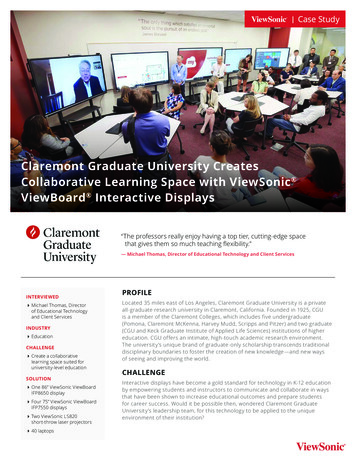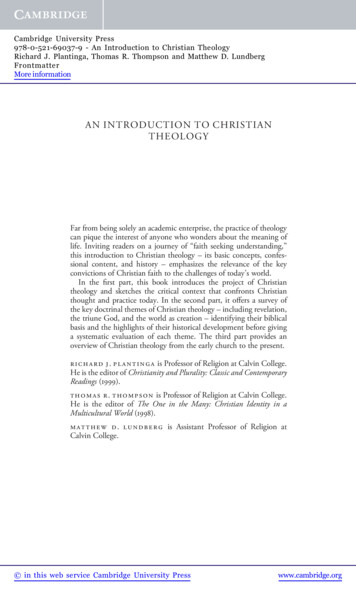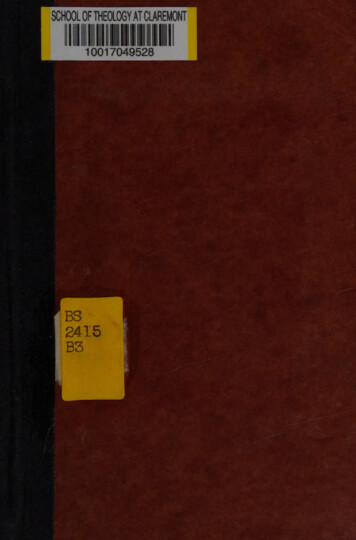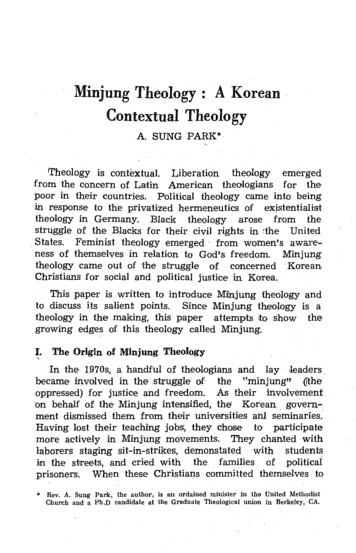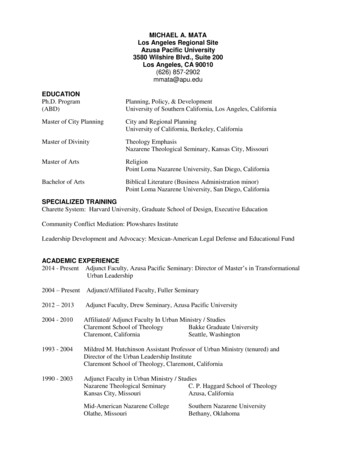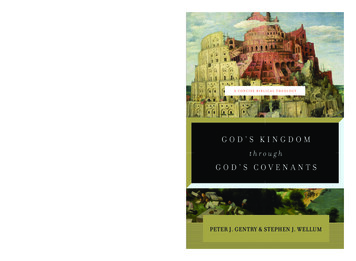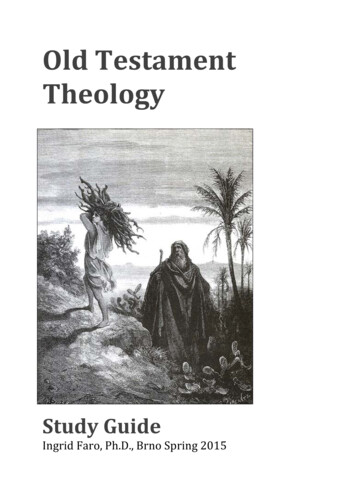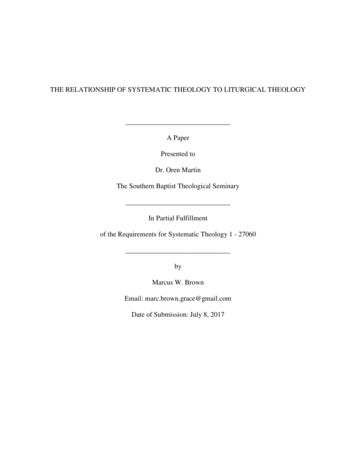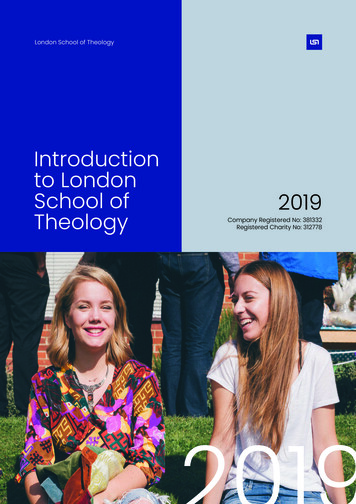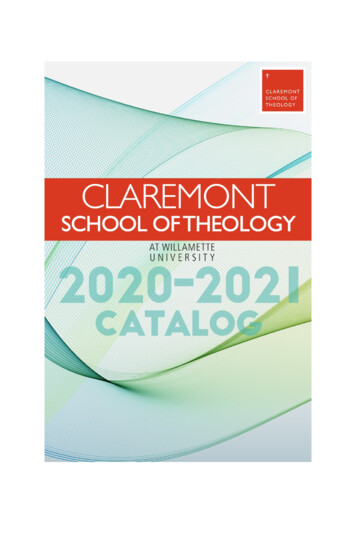
Transcription
CLAREMONT SCHOOL OF THEOLOGY AT WILLAMETTEUNIVERSITY CATALOG: 2020-2021 2020 by Claremont School of TheologyBy matriculating, all students agree to abide by the School’s rules and regulations.Claremont School of Theology at Willamette University reserves the right to change theconditions of admission or the course of study, revise degree requirements, academicpolicies and procedures, and/or change or cancel courses currently scheduled for theprogram of study without prior notification. Any changes in the conditions for admissionor in the program of study will be communicated to the student in writing.AccreditationClaremont School of Theology at Willamette University is accredited by the Associationof Theological Schools in the United States and Canada (10 Summit Park Drive,Pittsburgh, PA 15275, 4127886505); the Western Association of Schools and Colleges(985 Atlantic Ave., Ste. 100, Alameda, CA 94501, 5107489001); and is listed by theUniversity Senate of the United Methodist Church as one of the thirteen UnitedMethodist theological schools.CLAREMONT SCHOOL OF THEOLOGY1325 N. College AvenueClaremont, California 91711(909) 447-2500www.cst.eduShepard House900 State StreetSalem, Oregon 97301(503) 480-2305
Table Of ContentsHistory . 1Mission And Institutional Learning Outcomes . 3Overview Of Academic Programs . 4Academic And Service Centers . 10Institutional Partnerships . 122020-2021 Academic Calendar . 15The Campus . 18Student And Community Life . 19Student And Alumni/Ae Organizations . 20Student Awards . 22Community Lectures. 24Student Housing . 25Student On-Campus Employment . 25Admission . 26Eligibility Criteria . 26Application Process And Materials . 28Transfer Policies . 34Financial Aid . 35Applying For Financial Aid . 35Institutional Grants & Scholarships . 36Renewal Of Institutional Grants & Scholarships . 36Federal Aid . 37Financial Literacy . 38Satisfactory Academic Progress (SAP) & Institutional Renewal Requirement . 38Distribution Of Financial Aid Funds . 40Tuition And Fees 2020-2021 . 42Academic Policies And Procedures . 45Advisement And Registration . 55Degree Program Requirements. 61The Master Of Arts Program . 62Islamic Studies And Leadership Track . 63Islamic Education Track . 64Spiritually Integrative Psychotherapy Track. 64Master Of Theological Studies . 68The Master Of Divinity . 70Ministerial Leadership Track. 70Interfaith Chaplaincy Track . 75Islamic Chaplaincy Track . 78The Doctor Of Ministry Program . 79
Mentoring Doctor Of Ministry Program . 79Intensive Cohort Doctor Of Ministry Program . 84Hybrid/Online Doctor Of Ministry Program . 87Doctor Of Philosophy Degree . 90Doctor Of Philosophy In Practical Theology. 92Spiritual Care And Counseling (SCC) . 99Doctor Of Philosophy In Religion. 103Comparative Theology And Philosophy (CTP) . 109Hebrew Bible And Jewish Studies (HBJS) . 112New Testament And Christian Origins (NT) . 115Process Studies (PS) . 117Religion, Ethics, And Society (RES) . 121Graduate Certificate Programs . 125Policy Statements . 128Animal Policy – Claremont Campus . 128Claremont School Of Theology Title Ix Complaint, Investiagation, And ResolutionProcedures (Including Sexual Misconduct) . 130Claremont’s Compliance With The Higher Education Opportunity Act (HEOA) Peer-ToPeer File Sharing Requirements . 142Copyright Policy . 144Claremont’s Digital Millennium Copyright Act (DMCA) Notification Procedures . 144Claremont’s Technology Acceptable Use Policy . 146Drug-Free Campus Policy – Claremont Campus. 149Equal Employment Opportunity And Affirmative Action Policy . 150Firearms And Weapons Policy . 151Intellectual Property Policy . 152Policy For Research With Human Participants . 153Policy On Harassment, Including Sexual Harassment . 154Services For Students With Disabilities . 154Student Complaint Policy . 155Student Gift Policy . 155Student Judicial Review Policy . 156Student Records And The Family Educational Rights & Privacy Act (FERPA) . 157Summary Of Civil And Criminal Penalties For Violation Of Federal Copyright Laws . 159Vehicle Policy – Claremont Campus . 160Whistleblower Policy . 162Course Descriptions . 163Claremont School Of Theology Course Listings . 163Episcopal Theological School Courses . 196The Faculty. 197Visiting Faculty . 206Research Professors . 206Visiting, Adjunct And Other Faculty . 208Administration . 213Staff . 216The Board Of Trustees. 217
HISTORYClaremont School of Theology traces its history to 1885 when Rev. Charles Maclay founded theMaclay College of Theology in San Fernando, California, a town that also attributes Maclay as itsfounder. Maclay’s nephew, Judge Robert Widney Maclay, was instrumental in founding theMethodist-related University of Southern California in 1880 and the Maclay College of Theologybecame one of its branch schools.By 1894, financial difficulties caused the school to relocate to the USC campus in Los Angeles so itcould continue to live out its mission. In 1922, USC gained state accreditation and combined theThe Maclay College of Theology with their Department of Religious Education to become theSchool of Religion on the Maclay Foundation.In 1952, USC was seeking external funding for their medical school and other departments butlegally, public funds could not be given to a religious institution so plans were made to disconnectfrom the Methodist Church. By 1956, the School of Religion had to choose to remain at USCteaching from the perspective of Religious Studies or leave USC to continue their mission oftheological education to train persons for various forms of ministry. The faculty of the USC Schoolof Religion chose to leave USC and form an independent corporation related to the then SouthernCalifornia-Arizona Annual Conference of The Methodist Church. The new corporation was theSouthern California School of Theology and, in 1957, settled on a vacant lot of land in Claremont.The first building was dedicated in January of 1960. The corporation was popularly known as theSchool of Theology at Claremont (STC). In 1996, the School’s name changed to Claremont Schoolof Theology (CST). During our years in Claremont, the School developed a world-renownreputation through our Center for Process Studies, the Clinebell Institute, the Ancient BiblicalManuscript Center, the Moore Multicultural Center, the Center for Sexuality and Religion, and theCenter for Engaged Compassion, among others. Additional Masters and Doctoral degrees weredeveloped to serve the needs of the changing world. Academic and ecumenical partners werecultivated, most notably with the Claremont Graduate University, the Disciples SeminaryFoundation, the Episcopal Theological School at Claremont, the Evangelical Lutheran Church ofAmerica, and the African Methodist Episcopal Church. By 2011, an interfaith project resulted inthe creation of two new graduate institutions that came under the School’s umbrella, ClaremontLincoln University 1 and Bayan Claremont 2 (a new Islamic Graduate School), as well aspartnerships with the Academy of Jewish Religion, California, and the University of the West (aBuddhist-affiliated institution). The result was rich faculty collaboration and cross-registrationoptions for CST students. The School’s years in Claremont were full of pioneering new avenues fortheological education.In order to continue our mission to the fullest, a decision was made to partner with WillametteUniversity in Salem, OR. An Affiliation Agreement between CST and Willamette was signed inMay 2019, and the CST incoming Class of 2019, began their studies at the Willamette campus.Seven presidents have provided leadership for the School: Ernest Cadman “Pomp” Colwell (1957-1968) Gordon Michalson (1968-1977) Richard Cain (1977-1990) Robert W. Edgar (1990-2000) Philip A. Amerson (2000-2006)12Claremont Lincoln became an independent institution in 2014.Bayan moved to Chicago Theological Seminary in 2019.1
Jerry D. Campbell (2006-2013) Kah-Jin Jeffrey Kuan (2013-present)2
MISSION AND INSTITUTIONAL LEARNING OUTCOMESMissionClaremont School of Theology is United Methodist in origin and affiliation; and ecumenical andinterreligious in spirit. Students are nurtured by Scripture, tradition, experience, and reason and areprepared for lives of ministry, leadership, and service. Graduates are prepared to become agents oftransformation and healing in churches, local communities, schools, non-profit institutions, and theworld at large.Institutional Learning OutcomesAs leaders in a diverse and rapidly changing world, graduates of the Claremont School of Theologywill be able to:1. Demonstrate a basic understanding of the major forms in which Christianity has been andis being expressed.2. Bring their own faith into constructive dialogue with the range of religious/non-religiousoptions available in our society.3. Synthesize thought and practice in ways that enable them to be effective religious leadersin today’s complex world.4. Utilize techniques of spiritual formation for living out their vocation with integrity.3
OVERVIEW OF ACADEMIC PROGRAMSClaremont School of Theology offers the following academic programs:MASTER OF ARTS (Religion)The Master of Arts (M.A.) is a 48-credit degree that combines academic excellence andopportunities for vocational exploration with the goal of preparing students for further graduatestudy, various forms of religious leadership and ministry, for general education and enrichment.The tracks available in the Master of Arts degree program include: Islamic Studies and Leadership,Islamic Education, Spiritually Integrative Psychotherapy, and Interdisciplinary or ComparativeStudies. Students must complete a summative exercise at the end of their program which takes theform of a master’s thesis, a major paper, or a paper/project.MASTER OF THEOLOGICAL STUDIESThe Master of Theological Studies (M.T.S.) is a 48-credit degree program that combines with thegoal of preparing students for further graduate study or for general educational and vocationalenrichment. The areas of concentration for the M.T.S. degree program include: Biblical Studies,Ethics & Social Change, Interreligious Studies, Ministry, Process Studies, Religious Education,Spiritual Care & Counseling, Spiritual Formation, and Theology. At least four courses must betaken in one of these areas. At the end of their program a student must complete a summativeexercise, which may take the form of a master’s thesis, a major paper, a project, or a capstoneseminar.The program is informed by the history of Christian reflection and practice, by deep and opendialogue between religious traditions, and by the quest to understand and respond constructively tothe contemporary world. It presupposes the need for scholars and religious leaders who are able topositively engage the needs of the world through an understanding of past traditions, presentdialogue, and a continuing quest for understanding wisdom.MASTER OF DIVINITYThe Master of Divinity (M.Div.) is a 72-credit degree that combines academic excellence withspiritual formation and social engagement in order to prepare religious leaders for vocations in avariety of types of ministry. Offered in two modalities – on-campus and hybrid – the traditionalM.Div. program is informed by the history of thought and practice within Christianity, by exposureto the cultural and religious diversity within Christianity, dialogue with other religious traditions,and by the quest to understand and respond constructively to the contemporary world. And now theM.Div. degree program has been expanded beyond its Christian focus, by offering tracks inInterfaith Chaplaincy and Islamic Chaplaincy, as well as the traditional Ministerial LeadershipTrack. It presupposes that men and women can exercise responsible leadership only when theycombine an intimate knowledge of their own traditions, appreciation of other forms of spiritualpractice and insight, a deep engagement with today’s social and political realities, and strongdialogical and critical thinking skills.4
CONCURRENT/DUAL MASTER OF DIVINITY/MASTER OF ARTSStudents pursuing pastoral ministry who want to acquire an in-depth concentration, as well asstudents seeking ordination but who expect to pursue Ph.D. studies, may want to consider aconcurrent or dual Master of Divinity/Master of Arts program. This 96-credit program consists oftwo separate admissions processes, leading to two distinct degrees with the recipient receiving twodiplomas, but with shared credits between the M.Div. and M.A. programs. The degrees are grantedsimultaneously (not sequentially).DOCTOR OF MINISTRYThe Doctor of Ministry (D.Min.) is a 28-credit degree that offers opportunities for spiritualdevelopment as well as for growth in knowledge and pastoral competency. The D.Min. programconcludes with a practical research project that is designed to benefit the student’s own ministryand contribute to broader religious communities. Claremont School of Theology has three avenuesfor pursuing the D.Min. degree.1.2.3.Mentoring D.Min.: Students who enroll in the Mentoring D.Min. program participate inthe semester schedule at CST taking face-to-face, online, hybrid, or intensive classesduring the regular academic year. Students are empowered to follow their particularacademic and ministerial interests under the personalized guidance of a faculty mentor.D.Min. in Practical Theology of Conflict, Healing, and Transformation in KoreanContexts (Cohort model): The Doctor of Ministry in Practical Theology of Conflict,Healing, and Transformation in Korean Contexts Program is specifically designed forKorean and Korean American religious professionals who work in Korean or otherintercultural contexts. Courses are taught by faculty from CST and other Korean andKorean-American scholars from other theological schools. This program arises from thecontemporary Korean and other intercultural ministry contexts in which rapid socialchanges result in many forms of individual, familial, congregational, and social conflicts.Instruction is in Korean.D.Min. in Spiritual Renewal, Contemplative Practice, and Strategic Leadership(Hybrid/Online): Students in the Hybrid/Online program take one multi-day, in-personintensive per year and may take up to half of the degree online. This program is designedfor clergy and other spiritual leaders of any tradition, including leaders in transition.DOCTOR OF PHILOSOPHYThe Doctor of Philosophy is a 48-credit degree that prepares students for research, teaching inhigher education, as well as professional leadership in religious traditions and society. The Ph.D.degree program enables students to develop scholarly competence in a specialized field of study inthe context of theological and religious studies disciplines. Students will engage the methodologicaland epistemological presuppositions of the field of concentration and will be capable of advancingthe field through original research. The Ph.D. degree requires examinations in modern researchlanguages, qualifying examinations, and the completion of a dissertation, as well as the uniquerequirements of each area. Claremont School of Theology offers two Ph.D. programs withconcentrations within each:Ph.D. in Practical Theology Education and Formation Spiritual Care and CounselingPh.D. in Religion Comparative Theology and Philosophy Hebrew Bible and Jewish Studies New Testament and Christian Origins5
Process StudiesReligion, Ethics, and SocietyPhilosophy of Religion and TheologyDOCTOR OF PHILOSOPHY IN PRACTICAL THEOLOGYThe Doctor of Philosophy in Practical Theology degree program has two areas of concentration:Spiritual Care and Counseling or Education and Formation. Students applying to the Ph.D. inPractical Theology must have completed either a Master of Divinity degree or a master’s degree,ideally related to their chosen area of concentration.Education and FormationThe Education and Formation concentration integrates theology with educational theory andpractice and/or with the processes and perspectives of spiritual formation. Students developadvanced competence in theoretical construction and practice and, through original research,contribute to the development of their fields. Students with limited practical experience in the fieldmay be required to participate in an appropriate practicum or internship at the discretion of theiradvisor.Students concentrating in Education and Formation choose one among three tracks: Interreligious Education Religious Education Spiritual FormationSpiritual Care and CounselingThe Spiritual Care and Counseling concentration is designed for advanced training in research andtheory construction at the intersection of the behavioral sciences, counseling, psychology, andtheology. In addition, in dialogue with research and theory building, students prepare forspecialized ministries in clinical spiritual care, ACPE supervision, or spiritually integrativepsychotherapy.Students concentrating in Spiritual Care and Counseling choose one among three tracks for theirclinical education: Clinical Spiritual Care (chaplaincy): prepares students for chaplaincy and ministries inpublic and private service settings (for example, shelters and other residential services,social service agencies, program for specific populations, such as the aging). ACPE (Association for Clinical Pastoral Education) Supervisory Track: preparesstudents to work as certified supervisors in CPE programs accredited by the Associationfor Clinical Pastoral Education, Inc. Spiritually Integrative Psychotherapy Track: prepares students to provide counseling andpsycho-educational services in congregations, agencies, and other settings.DOCTOR OF PHILOSOPHY IN RELIGIONThe Doctor of Philosophy in Religion offers six areas of concentration: Comparative Theology andPhilosophy; Hebrew Bible and Jewish Studies; New Testament and Christian Origins; ProcessStudies; Religion, Ethics and Society; and Philosophy of Religion and Theology. Students applyingto the Ph.D. in Religion will ordinarily have completed a Master’s of Divinity but, with theapproval of the faculty in the field, may be admitted to the Ph.D. after having completed aminimum of 24 hours of graduate work appropriate to the field of study.Comparative Theology and PhilosophyThe Ph.D. program in Comparative Theology and Philosophy (CTP) develops doctoral-levelcompetence in the comparative study of religious beliefs, worldviews, and practices. Religious6
beliefs and practices are frequently analyzed solely from the perspective of a single religioustradition, or they are reduced to their social, political, or even biological functions. The CTPprogram presupposes both that beliefs are an important part of the study of religious traditions andthat an adequate comprehension of any given religion requires the study of its similarities anddifferences from other traditions.Contextual Theologies (Global Ph.D.)The Claremont School of Theology offers a 48-credit Global Doctor of Philosophy in ContextualTheologies. The program is a cohort-based, distributive learning program that is primarily designedfor students already engaged in theological education in Asia. The program is designed to givestudents broad and interdisciplinary training that will equip them to teach a variety of courses, aswell as opportunity to choose an area of concentration for their research. The program is done incollaboration with Chang Jung Christian University in Tainan, Taiwan.Hebrew Bible and Jewish StudiesThe Ph.D. program in Hebrew Bible and Jewish Studies provides advanced training in the criticalinterpretation of the Hebrew Bible and the History of Judaism and Jewish Thought for studentspreparing for research and teaching in institutions of higher education, religious and communityservice, and other relevant contexts. The degree requires rigorous training in the ancient biblicallanguages, including Hebrew, biblical and rabbinic Aramaic, modern research languages, includingGerman, French, modern Hebrew, Yiddish, and others; and in the modern critical study of theHebrew Bible, rabbinic literature, medieval and modern Jewish thought, and Jewish history fromantiquity through modern times. Training in the program presumes competence in the broaderfields of religious studies, particularly the study of world religions.Tracks within Hebrew Bible and Jewish Studies include: Interpretation of the Hebrew Bible in the contexts of the ancient Near Eastern, GrecoRoman, and Jewish worlds Interpretation of rabbinic literature (including Jewish mysticism) in the contexts of lateantiquity and the subsequent development of Judaism and Jewish thought Study of modern Jewish thought, literature, and history.New Testament and Christian OriginsThe Ph.D. program in New Testament and Christian Origins provides advanced training in thecritical interpretation of ancient Christian texts for students preparing for research and teaching ininstitutions of higher education, religious and community service, and other relevant contexts. Theprogram focuses on the New Testament and related literatures in the context of post-biblicalJudaism, classical Greek and Hellenistic literature, religion and philosophy, and the cultures of theearly Roman Empire.Process StudiesProcess thought is a philosophical system that describes the world in fundamentally relationalterms. According to process thought, every credit of reality is in an ongoing process of change, andeverything that occurs is a confluence of one’s inherited past, contextual possibilities and individualagency. This graduate program explores the wide range of methods, themes, and applications ofprocess thought, with special attention to Alfred North Whitehead’s “philosophy of organism.”Whitehead’s contributions are assessed in the context of other philosophies of process thought ofwhich dozens have been identified in Western philosophies and in the non-Western philosophicaltraditions.The multiple applications of process thought
Southern California School of Theology and, in 1957, settled on a vacant lot of land in Claremont. The first building was dedicated in January of 1960. The corporation was popularly known as the School of Theology at Claremont (STC). In 1996, the School's name changed to Claremont School of Theology (CST).
